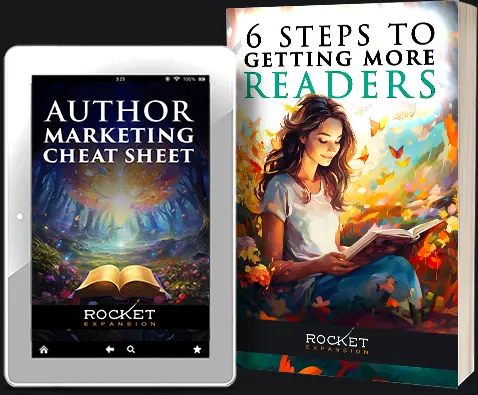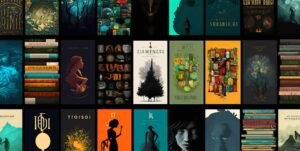Blogging for Writers: Advice From The Experts

As an author, you want people not only reading the books you write but also staying up to date with you and your work. This helps you sell books more easily and build your reputation and online presence as an author.
The first step towards this is having a great author website that allows readers to connect with you and discover the world you’ve created, all on one engaging platform.
Another crucial part of your online presence as an author?
Your author blog.
It is no small feat to create a great author blog. It requires commitment, time and energy to making it a great piece that people want to read.
To make sure you have all the best advice from all the top author bloggers and author blogging experts out there, we’ve researched what the industry pros recommend you should and shouldn’t do. We’ve also added our own advice from working with million-book selling authors and bestsellers across a wide variety of genres.
Your Blogging Strategy: Getting Started
When getting started with an author blog, as with any other content you are putting out there, you need a content strategy.
This is simply “a strategy that takes your business goals, and then uses content as a primary means to achieve those goals” as put by Create If Writing. It is the best way to assure that you stay on brand and achieve the exact goals you have set out as an author.
Of course, one of the points behind having an author website and an accompanying blog is to get people to buy your books. But if you don’t have great content to share on this blog no one is going to want to read it!
A good content strategy allows you to plan this out and know what you’re feeding your audience, when you do it and why it’s done.
There are two main areas to concentrate on when it comes to content. Let’s address them by saying what not to do…
Two Blog Writing Mistakes To Learn From: Wrong Audience, Bad Time Management
Blogging will take up more of your time, so it’s important to make sure it’s worthwhile.
Two big mistakes that authors can make when it comes to writing a blog are either spending too much time writing a piece or ultimately attracting the wrong audience.
Writing a blog and writing a book are worlds apart.
With a blog, you’re being punchy with content that is consumable, easy to read and constant. With a book, it’s quite the opposite, with character building, complex paragraphs, and plots that twist & turn.
Getting the style and topics of your blog will take some time as it’s very specific and will vary from author to author, genre to genre. But once you’ve got it down, it’ll become easier.
That is, of course, given that you’ve got the right audience in mind when writing.
As an author of your genre, you know your audience inside out. Who better to put out more frequent, personal and snackable content for your readers than you?
Keep your audience in mind when putting your blog pieces together. Don’t only think of what books they’re wanting to read. Engage with their general interest around your genre as well. See what is generating the most buzz within your space and touch on this too.
Want to know what people are really interested in online? Here’s how you find out…
Research Your Keywords
Keywords are what people put into Google when they’re searching for answers. If you find out what these are, you’re one step closer to understanding what content your audience wants to engage with.
All you have to do after that is give them your unique take on what they’re searching for.
Make sure you do Google searches around your blog ideas to gauge interest in your topics before writing.
If you want to really dive deep into this, be sure to check out our mega-post on SEO for authors.
What To Blog About As An Author?
While you can blog about almost anything, there are specific types of blogs that seem to work better than others.
Three Types of Blog Posts To Get You Started
Something pretty much anyone that gets started with blogging for the first time will experience is the overwhelming question of “what on earth do I start with?”
Well, fret no more because we’ve got you.
Your first few blogs in essence are an introduction to you on a more personal level as a means of truly connecting with your audience.
So keep it simple but effective as you introduce this side of you and your work from a different angle.
Remember, your blog is a completely different form of expression to your books! So apply this in both what you write about and how you do it. Stand Out Books gives a great layout of what authors should be blogging about.
Posts On Your Personal Life
Your first blog will set the tone for your readers, allowing them to gauge the nature of your blog and in turn, you. Start with something authentic and very much ‘you’ that allows readers to connect with you on a more personal level.
An easy way to get started with something like this is to blog about your personal life.
Introduce yourself as you would conversationally and share what comes to mind naturally. Be it a recent experience, a current situation, or just sharing a bit more about you with your fans.
Posts On World-Building
Next, entice readers with extras that add to the world you’ve created as an author. This will get them engaging much more with your work and anything else you put out there.
This could be behind-the-scenes extras, backstories, deleted scenes or unreleased information when you were creating the story.
By sharing these extra bits of information you are creating two benefits to your platform.
On one hand, you are able to give current readers a constant reason to stay connected. On the other hand, you are giving newcomers a sneak-peek into your world and the work you create.
For the latter, this ultimately builds presence in the mind. Through giving these ‘free snippets’, you will eventually get them to buy a book and start becoming fans of your work.
Post About What Inspires You
The next topic to dabble with is speaking about what inspires you. Here, you can break down your writing process a bit and allow readers to understand how you create the work they love so much.
Go into what inspires you, how your stories come about, what you do to avoid distractions, and what you do when you feel a bit stuck.
This is real and authentic, and also very much a ‘you’ thing that nobody else can do in the exact same way! And it is exactly what your readers are looking for. They are not only seeking to know about the stuff they’ve already read, but so much more!
Allow them a bit of insight into your world and how you are able to create it by sharing with your loyal fanbase.
10 More Things To Blog About
Well, what should you start blogging about while you’re writing your book or before you even start writing at all? According to The Writing Cooperative, the 10 things to blog about are:
- Behind-the-scenes
- Character Sketches
- Curated Links
- Excerpts
- Reviews and Opinion Pieces
- Advice
- Book Cover Inspiration
- News and Updates
- Personal Pieces
- Interviews
Other Important Blog Topics
Publishing Addict has a bunch of great suggestions when it comes to other great blog topics that are also super important to check off.
Focus on the course of action for upcoming books and future work; this is a great way to get fans excited for what’s to come and even have them engaging with the conversation.
Think of future topics in upcoming books, alternative book endings for past work, character inspiration or even who didn’t quite make the cut & why, and of course excerpts from your books.
Other great ideas for upcoming blogs could be a simple thank you to your readers for their support, the commemoration of milestones, contests or any news and press you’d like to share.
It’s always good to share things on a personal level, so try to connect with your readers as best you can and open up a different side to their favorite author that they get to share.
Blogging By Genre
As with writing in general, blogging will be very specific from genre to genre and depend heavily on the type of work you prefer to put out there.
Nonfiction
Jane Friedman claims that writers in this genre “have it easy” as naturally the subject matter of their work is already suitable for great blog topics.
This is a great advantage as you know your field and audience really well from a practical point of view for blogging, namely the most frequent questions, popular topics and constant issues people face.
Use this as a launchpad for your articles and future topics as it is clearly relevant, needed and great to work off of.
Fiction
Jane adds that fiction writers can have successful blogs too, this is achieved by honing in on a given topic, specific theme or even subgenre to focus on.
Once again, you know your audience best. So use that to your advantage.
Work off what has worked in the past and then experiment with genre-related or topic-specific things that your readers are guaranteed to love. Don’t limit yourself to the confines of literary work in the genre, think of other forms of media, food, pop culture or even music that you could use to further engage and immerse your audience into your created world.
A great example of this could be creating a playlist of music and a short explanation as to the meaning behind it as a whole and the choice of songs. This could accompany your body of work really well and keep fans coming back for more!
Guest Blogging
Another great way to build your blog is to use a well-established platform that already exists – another blog.
By finding another author within the same genre or expert in the field who you can collaborate with to get content out there, you allow yourself to build a platform in a different way.
This is great as it will get you connected whilst building your blog up, and also potentially acquiring new fans and readers of your work.
The Gist Of Blogging
We love Jane Friedman’s take on blogging, which she defines as “publishing material to a site that you own and control – usually your author website”.
She goes on further to drive home the point that blogging cannot be considered as something inferior to book writing and “if you approach blogging as something ‘lesser than’ your book writing or published writing, you’re more likely to fail at it.”
Yes, blogging is more informal, top of mind and of a social nature. It still requires skill, commitment and time, in the long run, to have a good blog .
Her starting point of advice is knowing your audience, something we couldn’t agree with more. Consistency is key and it comes down to two things: frequency and subject matter.
Staying constant and posting a blog frequently is the goal, however, always aim for substance over frequency.
Whether you are a fiction or nonfiction writer, as we’ve touched on in previous sections, you need to know who you are addressing and what they are searching for. This, hand in hand with keeping a regular schedule of your blogs will be a recipe for a great success story that will open up opportunity after opportunity for your author platform.
Jane also encourages experimentation to find what works for you, and this is truly the only way to get good at what you do!
Remember To Follow Content Marketing Rule #1
Content marketing 101: It’s about them, not you.
If you’re feeling a bit stuck with getting blogs out, why not turn to your consumers for inspiration? Instead of just working with your reader in mind, switch it up by starting with your reader and working from there.
By asking your readers what they want to see more of, or even what is and isn’t working, you are able to get more understanding on where to channel your work.
Bryan Collins suggests this as a good way to give focus to your work and make your posts based around the answers you get – in turn, making your posts about your audience!
Biggest Advantage To Blogging As An Author
An author blog will bring you many things, but most importantly it will develop a consistent writing habit.
This is invaluable as it is not only applicable to your blog writing, but will also translate over into the writing of your novels with more frequency, consistency and intent.
This also works in another way by committing to your author blog and writing regularly, new readers are likely to find you through your author blog if it is done correctly.
Once again, this is why staying constant with it is key! That along with the correct keywords, optimization and that killer content strategy we mentioned, and you’re off to the races.
How Blogging May Hold Your Writing Back
In terms of any cons that may come with the starting of your author blog, there are a few noteworthy ones to stay conscious of.
Firstly, how time-consuming it can be if not done correctly. Finding a balance between writing your blogs and writing your books can be tricky.
By optimzing your time and keeping your blogs concise but packed with intentful information, you are not only getting out note-worthy content but also making sure you’re not wasting time that you could spend writing a new book.
Stay conscious of the difference between being a little confused on what to write about initially, vs being confused entirely that you end up putting out half-hearted content frequently. Not addressing this as it comes up will result in it being a huge con in the long run.
Rather put out higher quality pieces less frequently than lower quality pieces weekly just out of the necessity of staying ‘relevant’. By not committing to blogging in the correct way, it could be more detrimental than not blogging at all.
Also, watch out for irrelevant content. This can cause readers to disengage with the pieces you end up putting out as it’s not what they’re wanting and looking for.
Final Thoughts
A good blog can help you connect to your audience in a more personal way, help you sell more books and at the end of the day, build a better and stronger author brand. It goes further to also establish you as a credible and adored expert within your genre – which is what it’s all about.
Remember, your blog is one piece of your entire author platform but it is truly a crucial part.
Your blog should enhance the user experience of your author website and keep readers coming back for more.
Looking to get started with your own author website to blow your readers away? Why not get in contact with us and get the process started today!

Want help with your author marketing? Get our FREE ebook and cheat sheet: 6 Steps To Getting More Readers.
By subscribing, you agree to get emails from me, Matt Ziranek. I’ll respect your privacy and you can unsubscribe any time.






